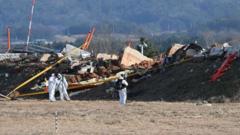Investigators have reported progress in examining the black boxes from the tragic Jeju Air plane crash that occurred last Sunday, resulting in the loss of 179 lives. The South Korean transport ministry has disclosed that data from the cockpit voice recorder has been successfully extracted, with plans underway to convert the information into an audio file. However, efforts to access data from the second recorder—a flight data recorder—are hindered by a missing crucial component. Authorities are currently deliberating on how best to retrieve and decode this critical data.
The Boeing 737-800, which was en route from Bangkok to Muan International Airport, crash-landed after colliding with a wall at the runway's end, creating a catastrophic explosion upon impact. The crash marks the deadliest aviation incident in South Korean history. According to Deputy Minister for Civil Aviation Joo Jong-wan, investigators are exploring various factors that may have contributed to the disaster, including potential bird strikes and adverse weather conditions.
Among the deceased passengers, whose ages ranged from three to 78, a majority were in their 40s, 50s, and 60s. Following challenges in identifying the victims' remains due to severe damage, authorities confirmed that all bodies have been identified as of Wednesday. With an overwhelming sense of grief permeating the nation, New Year’s celebrations have been muted in solidarity with the victims' families, and a period of national mourning has been declared for seven days.
In a statement, Jeju Air CEO Kim Yi-bae assured the public that the airline is dedicated to providing emergency compensation for grieving families, including covering funeral expenses. He reaffirmed that a pre-flight inspection did not reveal any issues with the aircraft prior to departure. As investigations continue into the crash’s causes, collaboration with the US National Transportation Safety Board is taking place to ensure a thorough examination of all aspects surrounding the tragedy.





















